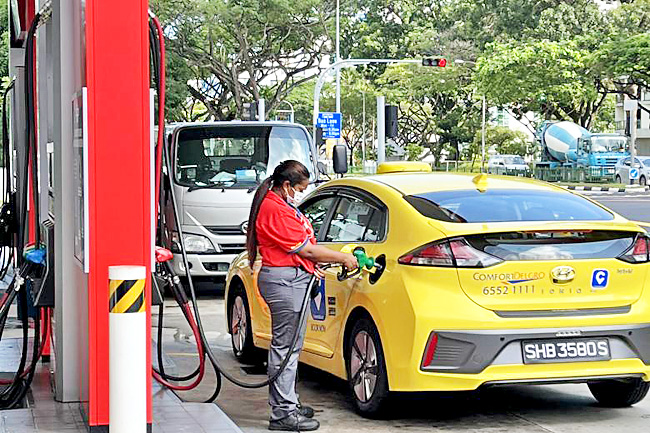THE STRAITS TIMES – As pump prices rise, service providers in the transport and logistics sector are feeling the heat.
Bus operators, delivery companies and cabbies The Sunday Times spoke to said they are now at their wits’ end.
About 30 per cent of their costs are transport-related, and now, with the surge in fuel prices precipitated by Russia’s invasion of Ukraine, they are among the first to be put through the wringer.
Some have resorted to cutting costs – be they in salaries or completely halting part of their operations. Others are assessing how much of the extra cost they need to pass on to customers to ride out the pinch.
“There is no point in asking if we are suffering – of course we are,” said Edmund Koh, owner of Koh Bus Transport Service, which does hired trips, including for construction workers.
“I have had to cancel bus trips because why should I run trips that cost me as much as I make? The drivers draw the same salary, the customers don’t want to pay more. It’s the bus owners who are affected,” he said.
The company has 11 buses, and its fuel costs have risen by SGD1,500 a month per vehicle – enough to hire one extra driver.
It now spends double what it did previously on fuel, said Koh.

For companies that have to ply the roads every day, this is but the latest in a string of woes that have befallen them in recent years.
First came Covid-19, upending all industry norms. Then, as economies elsewhere recovered, demand for fuel outstripped supply and fuel prices have been on the up since last year, devastating for an industry that typically already posts narrow profits for each trip.
Last Thursday, petrol prices, even the 92-octane fuel which can be used by the majority of cars here, were SGD3 or more a litre here – unheard of in recent years.
Philip Peh, president of Singapore School and Private Hire Bus Owners’ Association and owner of Tong Tar Transport Service, said “everyone in all industries has been bleeding money”.
“The sense is that if we are lucky enough, we can break even, but sometimes we can’t and end up in the red. My company and other bus companies are all looking at how we can manage the situation. We are still unsure of how to go about this.”
He said bus companies will most likely have to ask customers to pay “a bit more” by raising fees, until oil prices stabilise.
“We cannot hold for much longer at these costs.”
Amurdalingam Durairajoo, managing director of The National Forwarder, a company that transfers goods that enter the country by air to ships or warehouses here, said the logistics industry is being squeezed at both ends – by airlines on the one hand, and customers on the other.
Many airlines will soon be implementing fuel surcharges, he said. While some of these can be passed on to consumers, things like local transport costs cannot.
Many freight forwarders are bound by contracts with their customers and already absorb forklifting fees, which are also increasing as the equipment uses petrol and diesel.
Storage fees are also on the up, spurred on by disrupted global processes due to Covid-19 and rising demand for goods everywhere.
“We don’t profiteer from rising fuel prices and will be very transparent. We don’t know if we will pass on the higher costs yet, but we will have to replan everything,” Amurdalingam said.
“Obviously, we cannot just drive our trucks out whenever we need them, and will have to optimise routes. There needs to be multiple pick-ups and drop-offs to be worth our while,” he said.
An employee at school bus company RS Transport said drivers, due to company policy, have been absorbing the 30 per cent to 40 per cent increase in petrol and diesel costs since the start of the year.
“There is no way to cut school bus trips, so we are biting the bullet for now. Drivers are unhappy,” she said, declining to be named.
She hopes the government can offer some help. “Are there reserves? These could be released to help bring down pump prices.”
Another group of drivers that have been paying out of pocket for higher petrol costs are the 80,000 cabbies and private-hire drivers here, whose numbers have been steadily falling since 2020 due to the tough driving conditions.
The latest setback comes just as the number of trips finally returned to about 80 per cent of what it was pre-Covid-19 early this year.
Some are thinking of calling it quits.
“It’s sad to say, but what is the point of driving taxis any more. I’ll be leaving the company soon,” said Strides Taxi driver Patrick Lam, 55. “In January, I could make SGD60 to SGD80 after driving about 10 hours. Now I barely break even. There are also fewer people taking taxis nowadays.”
He used to pay SGD100 a week for petrol in January, but this has now doubled to SGD200. “Sometimes, it seems like we don’t get any help.”


